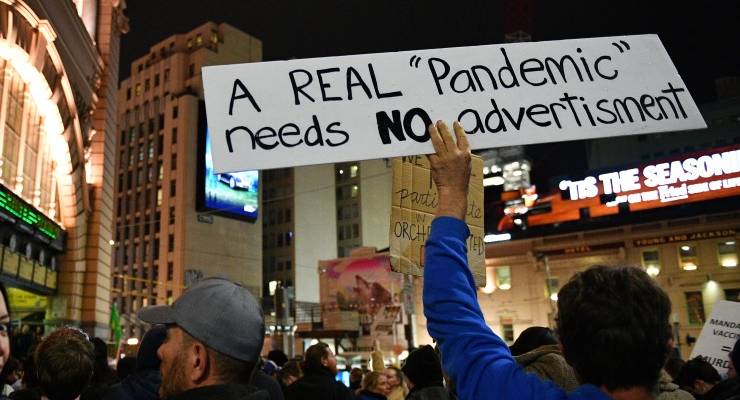
Another lockdown, another lockdown protest. Over the past week police have managed to prevent several anti-lockdown protests, stopping people from attending a rally in Sydney on Saturday by setting up city-wide checkpoints, and on Monday in Queensland as its tough lockdown was extended.
What makes people take to mass gatherings? New research shows that not only do those who breach regulations share some characteristics but that paranoia is making things worse.
Less agreeable, less conscientious
A study by the University of Sydney assessed behaviours and attitudes towards COVID-19 regulations in 1575 people in Australia, Canada, the UK and the US during the first wave of the pandemic and found men were 50% more likely to flout guidance than women.
About 90% of people comply with rules, but those who don’t were mostly male, less agreeable, less conscientious and more extroverted. They were also more likely to use denial and substance abuse to cope, and engage less with official information sources such as news websites and government publications.
The study’s author Sabina Kleitman tells Crikey the results didn’t find the non-compliant group had lower cognitive abilities but that they were less open to new experiences and creative ideas.
Feelings of paranoia have also increased during the pandemic, made worse for some Americans by mask mandates. Feelings of paranoia fuel conspiracy theories, causing changes in behaviour — meaning people who previously were likely to follow rules were less likely to.
The World Health Organization has found young people, and especially young men, are also more likely to engage in risk-taking behaviour — such as breaking COVID-19 restrictions — fuelled by social isolation, although Kleitman says there wasn’t enough data to show the impact age had on the relationship between gender and health-protective behaviour.
It’s not just about personality
Although deliberate rule-flouting might take place among some, others simply don’t have a choice — or come from backgrounds where they have reason to not trust the government, Ross Gordon, a member of the WHO’s technical advisory group on behavioural insights, tells Crikey.
“We need to try and deal with the personality factors, but external factors to the individual are important as well,” he said.
A key concern of many breaking the rules was ongoing employment. Although disaster payments might work, conversations need to be had with employers about whether someone will keep their position after restrictions end. Those living in crowded conditions may also not be able to work from home or be less willing to stay indoors.
Mistrust was another key concern, Gordon said: “One of the concerns in Sydney is people have got low trust in government in some areas because they’ve fled conflict in other countries where the government was oppressing them.”
Getting religious or community leaders or role models such as sports stars to deliver messages is important, as is making sure people were aware of the value of getting a vaccine or sticking to lockdown.
“That’s got to be some value in it for you to change your behaviour,” Gordon said, such as setting up roadmaps, targets for reopening and timelines for when the government’s emergency powers will be reduced.
So what about vaccination rates?
Studies have shown that men are typically more likely to support and get a vaccine — but vaccination rates in Australia are higher among young women who are receiving AstraZeneca instead of waiting for Pfizer — than young men. Of women aged between 20 and 24, 16.3% have received at least one dose of the vaccine compared with 9.8% of men.
Gordon says it may come down to young men having more tolerance for risk.
“Young people were ignored at the start of the pandemic because they were seen as not at risk as we protected older and more vulnerable people, but now we know the Delta variant is spreading like wildfire among young people,” he said.








I think it is important to note that the anti-lockdown protesters are being egged on by numerous LNP types and the lunacy evident in Sky and Fox news. It’s case study, as was (is?) the entire Trump era, of the power of political propaganda.
Creating nominally ‘conservative’ coalitions of believers in anything from pro-life and/or evangelical Christianity, white nationalists, far/alt right, QAnon etc. to win elections and indirectly support ‘radical right libertarian’ socio-economic ideology promotes climate science denial etc. by not opposing it….
So not just the feeble minded? Seems the ignorant and arrogant make an appreciable contribution as well. Either way this 10% get far more attention than their numbers warrant. Like litterbugs and drunks, just fine them and get them off the streets.
I thought I saw about as many women/girls at those protests as there were men – certainly among the number picked out, to be interviewed?
“Of women aged between 20 and 24, 16.3% have received at least one dose of the vaccine compared with 9.8% of men.” Could it be that these women work in health services?
During a Pandemic, disinformation kills people. Recently an anti-Vaxxer in the US was lying in his Intensive Care bed, sick with Covid and begging to be given a Vaccine. But it was too late for that and despite the best efforts of doctors, he died the following day. The man had not adhered to Social Distancing and never wore a face-mask, because he’d read on Social Media that Covid-19 was a Hoax.